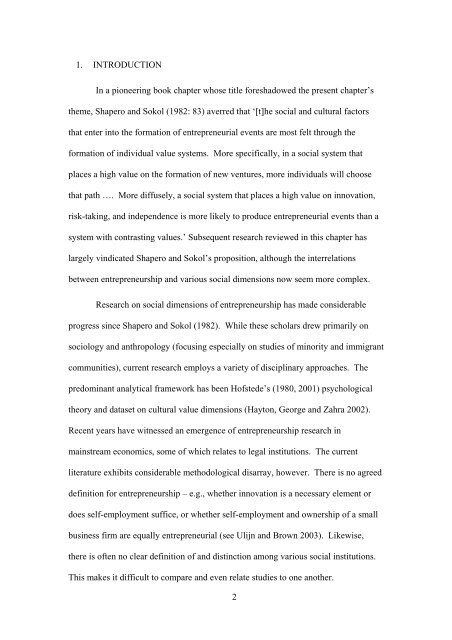Social Dimensions of Entrepreneurship. - People. hbs .edu ...
Social Dimensions of Entrepreneurship. - People. hbs .edu ...
Social Dimensions of Entrepreneurship. - People. hbs .edu ...
Create successful ePaper yourself
Turn your PDF publications into a flip-book with our unique Google optimized e-Paper software.
1. INTRODUCTION<br />
In a pioneering book chapter whose title foreshadowed the present chapter’s<br />
theme, Shapero and Sokol (1982: 83) averred that ‘[t]he social and cultural factors<br />
that enter into the formation <strong>of</strong> entrepreneurial events are most felt through the<br />
formation <strong>of</strong> individual value systems. More specifically, in a social system that<br />
places a high value on the formation <strong>of</strong> new ventures, more individuals will choose<br />
that path …. More diffusely, a social system that places a high value on innovation,<br />
risk-taking, and independence is more likely to produce entrepreneurial events than a<br />
system with contrasting values.’ Subsequent research reviewed in this chapter has<br />
largely vindicated Shapero and Sokol’s proposition, although the interrelations<br />
between entrepreneurship and various social dimensions now seem more complex.<br />
Research on social dimensions <strong>of</strong> entrepreneurship has made considerable<br />
progress since Shapero and Sokol (1982). While these scholars drew primarily on<br />
sociology and anthropology (focusing especially on studies <strong>of</strong> minority and immigrant<br />
communities), current research employs a variety <strong>of</strong> disciplinary approaches. The<br />
predominant analytical framework has been H<strong>of</strong>stede’s (1980, 2001) psychological<br />
theory and dataset on cultural value dimensions (Hayton, George and Zahra 2002).<br />
Recent years have witnessed an emergence <strong>of</strong> entrepreneurship research in<br />
mainstream economics, some <strong>of</strong> which relates to legal institutions. The current<br />
literature exhibits considerable methodological disarray, however. There is no agreed<br />
definition for entrepreneurship – e.g., whether innovation is a necessary element or<br />
does self-employment suffice, or whether self-employment and ownership <strong>of</strong> a small<br />
business firm are equally entrepreneurial (see Ulijn and Brown 2003). Likewise,<br />
there is <strong>of</strong>ten no clear definition <strong>of</strong> and distinction among various social institutions.<br />
This makes it difficult to compare and even relate studies to one another.<br />
2
















